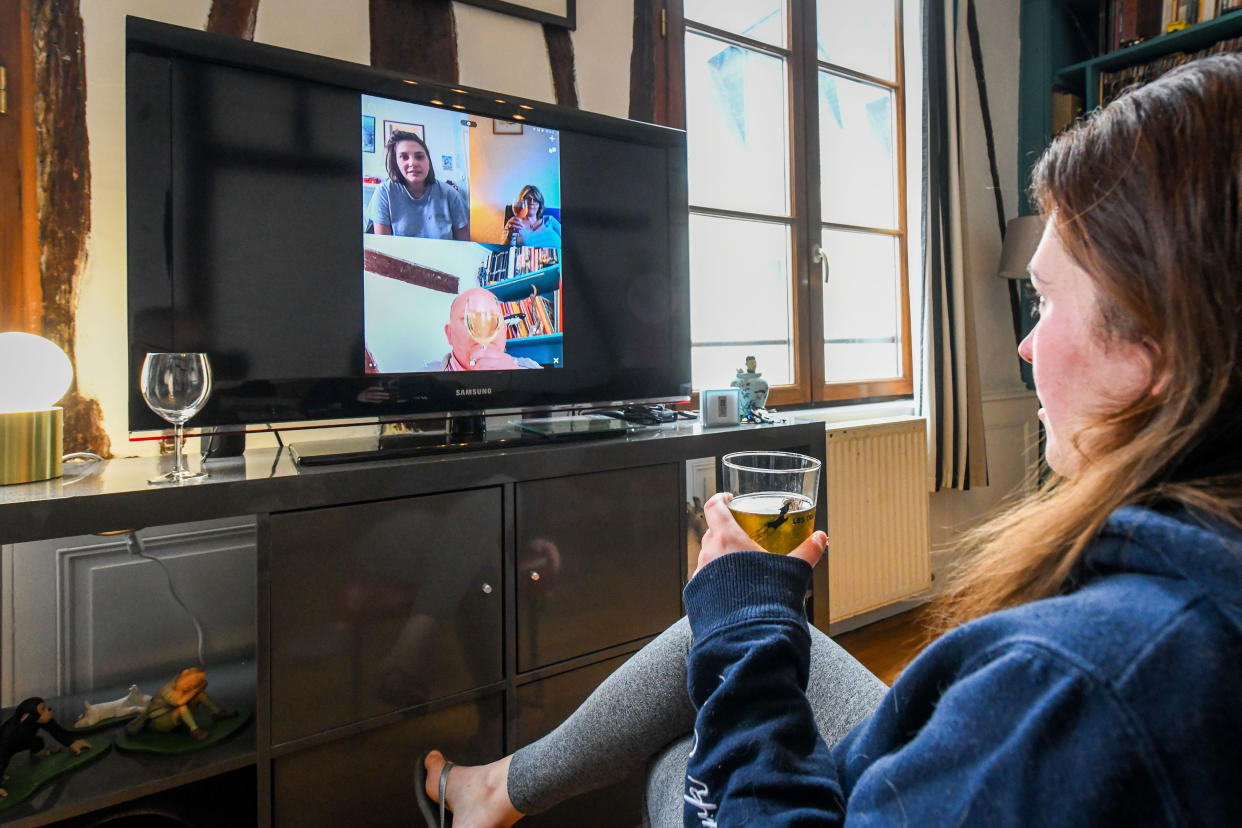Alcohol addiction and the coronavirus: Why this doctor says telemedicine is key right now

The coronavirus has impacted everyone’s way of life, but for those struggling with alcohol addiction, the past few months have been especially challenging. Alcohol sales have reportedly soared and experts worry that even those who have never grappled with alcohol dependency could develop unhealthy habits during the pandemic. Yahoo Life spoke with Dr. Abe Malkin, whose focus includes addiction medicine, about what treatment options look like in the COVID-19 era.
"I'm involved in various facets of the addiction world and what I'm seeing is, because of the quarantine, people are home and don't have a lot of other things to occupy their time," Malkin explains. "So, there are a lot of people who have been sober for years who are unfortunately relapsing due to the boredom and lack of other things to keep their mind occupied."
Malkin, the founder and medical director of Concierge MD LA, is based in Los Angeles and works with multiple treatment centers in the area, one of which is Monument, an online alcohol addiction treatment service. He also runs an in-home detox business for people who are reluctant to go to a facility and have the means to explore other options.
"A lot of people typically go to a treatment center when they relapse, which means they enroll at a residential center or a hospital where they're in a group setting," he shares. "Now, more and more people are opting for either home care or telemedicine where they're not going to be exposed to other people, and they're able to get care on their schedule in a way that's not putting themselves at risk."
Treatment centers have "seen a decline" amid the pandemic, according to Malkin, because people are reluctant to go where "they'll be in contact with other people."
"The home detox business has definitely picked up and people reaching out for virtual care has seen a dramatic increase," he states. While he gets inquiries from people across the addiction spectrum, right now, Malkin is commonly seeing two scenarios play out. “[People] who are really in acute withdrawal because they've been drinking for weeks and weeks and need a detox," he says, or people who have had a ‘minor relapse’ and ‘need to nip it in the bud.’”
For people experiencing acute withdrawal who can afford an at-home detox, Malkin sends a certified professional for around the clock care.
"We bring a nurse to the house who stays with you for five days and during that period of time, will basically detox you using medication to mitigate your withdrawal symptoms," he explains. “And that's a pretty unique and novel concept for most people in the past who would have said, ‘OK, I'm gonna go spend 30 days [in rehab].’”
When treating someone who has had “a quick relapse,” Malkin says he's leaning on "virtual tools."
"A huge part of recovery is a sense of accountability, being accountable to others. A lot of people choose [Alcoholics Anonymous] because it's that group mentality that makes them feel like they're apart of something and right now, there's a lot of social isolation, which is unfortunately causing people to relapse," he says.
"So, what we do is try and create that sense of community using virtual tools, whether it be a sober companion, a sober coach... someone to check in with them either over the phone or video regularly throughout the week to help guide them, coach them, mentor them, so that they don't ultimately relapse," he continues.
He noted "a huge part of addiction treatment" is "creating that sense of community and accountability."
"That's often more difficult now without group settings available," Malkin emphasizes. That’s why he believes telemedicine is the future of addiction treatment.
"A lot of rural communities are getting hit hard now. People are home, really, without access to their providers as [some] doctors offices have been closed," he adds. "Unfortunately, there's not a ton of great telemedicine resources for addiction treatment, but that's changing.”
One of the major players in this movement is Monument, a national platform that treats alcohol addiction virtually. Unlike A.A., which has no dues or fees, Monument has four different plans and pricing. There's a free option that offers virtual therapist-moderated support groups and an anonymous community. The priciest plan will cost someone $249 a month, which includes four 45-minute video therapy sessions, physician appointments and optional medication.
Malkin said telemedicine options are "expanding rapidly across the country," which will help people get access to resources that "weren't previously available."
"I think it's going to help a lot of people who don't have access to care," he continued.
Although regulations for telemedicine still vary considerably from state to state some state, many medical boards have loosened restrictions on telemedicine. Malkin urges anyone struggling to "reach out" to people around them — and to keep an open mind to virtual tools.
"Find your local providers, people who are offering alternative types of treatments other than necessarily group therapy, which isn't readily available right now," he says. "There's telemedicine, there's in-home options. Find that sense of community and accountability in any way you can. That's really the key to maintaining sobriety."
For the latest coronavirus news and updates, follow along at https://news.yahoo.com/coronavirus. According to experts, people over 60 and those who are immunocompromised continue to be the most at risk. If you have questions, please reference the CDC’s and WHO’s resource guides.
How to maintain your physical and mental health during the pandemic
Taking care of a loved one with COVID-19? Here’s how to stay healthy
Q&A with Dr. Kavita Patel: How to keep your family safe and maintain your mental health
Read more from Yahoo Life:
Want daily lifestyle and wellness news delivered to your inbox? Sign up here for Yahoo Life’s newsletter.



